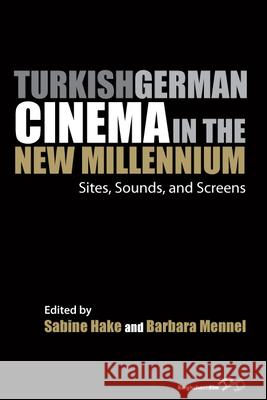Turkish German Cinema in the New Millennium: Sites, Sounds, and Screens » książka
Turkish German Cinema in the New Millennium: Sites, Sounds, and Screens
ISBN-13: 9781782386650 / Angielski / Miękka / 2014 / 260 str.
Turkish German Cinema in the New Millennium: Sites, Sounds, and Screens
ISBN-13: 9781782386650 / Angielski / Miękka / 2014 / 260 str.
(netto: 129,58 VAT: 5%)
Najniższa cena z 30 dni: 135,22
ok. 22 dni roboczych.
Darmowa dostawa!
" This book] ...breaks new ground in film-theoretical approaches to the field and points the way to future avenues of investigation. Particularly refreshing are chapters that take account of how Turkish German film intersects with new forms of spectatorship...in its attention to a variety of media and genres, theoretical frameworks, institutional contexts, and its rare inclusion of perspectives from outside Germany...The volume pushes the boundaries of existing scholarship. More than just a survey, it offers productive models for future studies in the field." - German Quarterly "This volume presents an impressive array of essays ... which will be essential reading in German and European culture programs, cinema studies, and minority/diasporic culture studies. The collection emphasizes not only the variety of cultural products here summarized under "Turkish German cinema," ... but also methodological diversity." - Katrin Sieg, Georgetown University "I believe this volume] is going to be a genuine contribution to a very lively yet underresearched area of film studies. It] will serve as a rich model for scholarly study in film departments, as well as appealing to a wide range of readers, particularly inter- and multi- disciplinary minded scholars." - Nezih Erdogan, Izmir University of Economics In the last five years of the twentieth century, films by the second and third generation of the so-called German guest workers exploded onto the German film landscape. Self-confident, articulate, and dynamic, these films situate themselves in the global exchange of cinematic images, citing and rewriting American gangster narratives, Kung Fu action films, and paralleling other emergent European minority cinemas. This, the first book-length study on the topic, will function as an introduction to this emergent and growing cinema and offer a survey of important films and directors of the last two decades. In addition, it intervenes in the theoretical debates about Turkish German culture by engaging with different methodological approaches that originate in film studies.
"[This book] ...breaks new ground in film-theoretical approaches to the field and points the way to future avenues of investigation. Particularly refreshing are chapters that take account of how Turkish German film intersects with new forms of spectatorship...in its attention to a variety of media and genres, theoretical frameworks, institutional contexts, and its rare inclusion of perspectives from outside Germany...The volume pushes the boundaries of existing scholarship. More than just a survey, it offers productive models for future studies in the field." · German Quarterly"This volume presents an impressive array of essays ... which will be essential reading in German and European culture programs, cinema studies, and minority/diasporic culture studies. The collection emphasizes not only the variety of cultural products here summarized under "Turkish German cinema," ... but also methodological diversity." · Katrin Sieg, Georgetown University"I believe [this volume] is going to be a genuine contribution to a very lively yet underresearched area of film studies. [It] will serve as a rich model for scholarly study in film departments, as well as appealing to a wide range of readers, particularly inter- and multi- disciplinary minded scholars." · Nezih Erdogan, Izmir University of EconomicsIn the last five years of the twentieth century, films by the second and third generation of the so-called German guest workers exploded onto the German film landscape. Self-confident, articulate, and dynamic, these films situate themselves in the global exchange of cinematic images, citing and rewriting American gangster narratives, Kung Fu action films, and paralleling other emergent European minority cinemas. This, the first book-length study on the topic, will function as an introduction to this emergent and growing cinema and offer a survey of important films and directors of the last two decades. In addition, it intervenes in the theoretical debates about Turkish German culture by engaging with different methodological approaches that originate in film studies.











